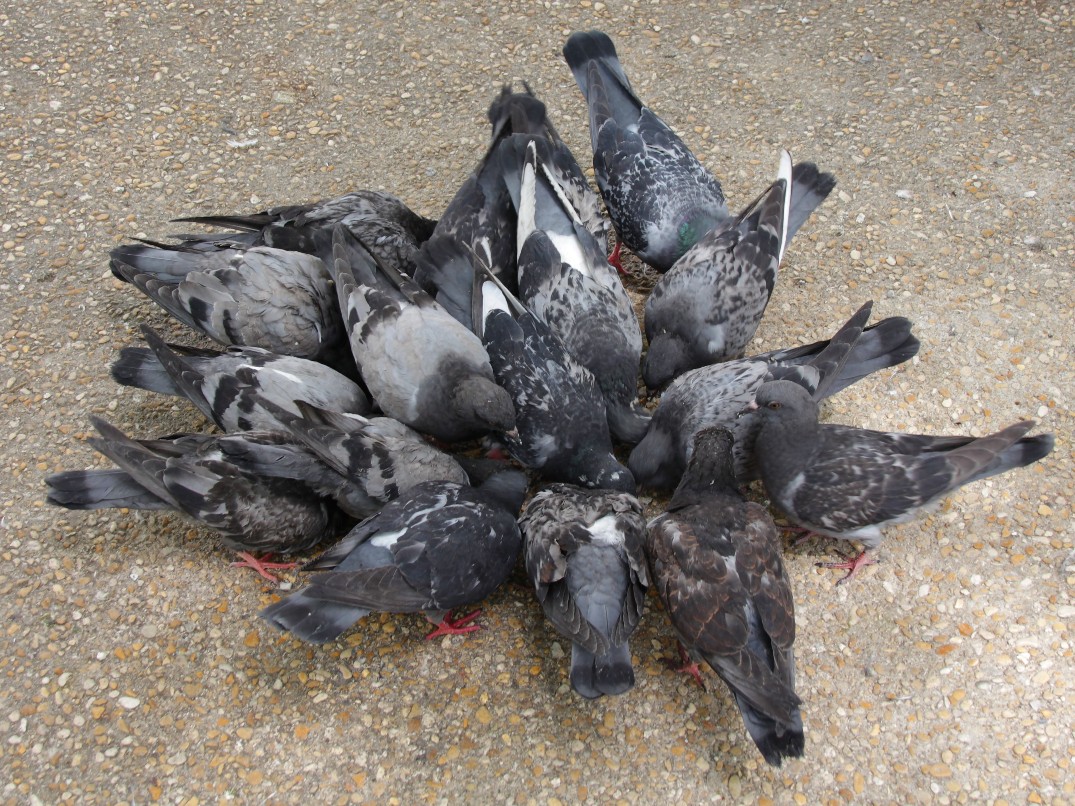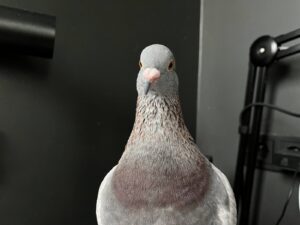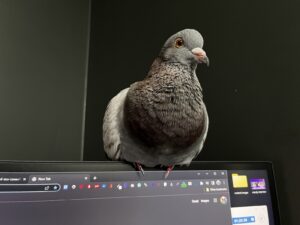What do pigeons eat? Learn all you need to know about the pigeon diet!
Hello there, fellow pigeon enthusiasts! Today, we’re diving deep into a topic that’s close to my heart and crucial to our feathered friends – the diet of pigeons.
As a proud parent to my rescued pigeon, Gerard, I’ve spent countless hours learning about and providing for his dietary needs, and I’m excited to share my insights with you all.
Understanding what pigeons eat is incredibly important, and not just for those of us who share our homes with these charming birds. For those who enjoy the companionship of these avian wonders from afar or simply want to know what to offer the pigeon who’s taken to visiting their window ledge, this knowledge is key.
Why is it so crucial to understand their diet, you ask? Well, much like us humans, the health and wellbeing of pigeons are directly linked to what they eat. The right diet ensures they have the energy to fly and the nutrients to stay healthy.
But that’s not all – diet can also impact their behavior, their reproduction, and even their lifespan.
This is particularly important for those of us who have pet pigeons, like my lovely Gerard. It’s our responsibility to make sure that their dietary needs are met, especially because they may not have the same access to a variety of foods as their wild counterparts do.
So whether you’re a fellow pigeon pet parent, a casual bird feeder, or simply someone with a curiosity about these remarkable birds, I hope you’ll join me on this journey of understanding. Let’s delve into the world of pigeon diet together!
JUMP TO:
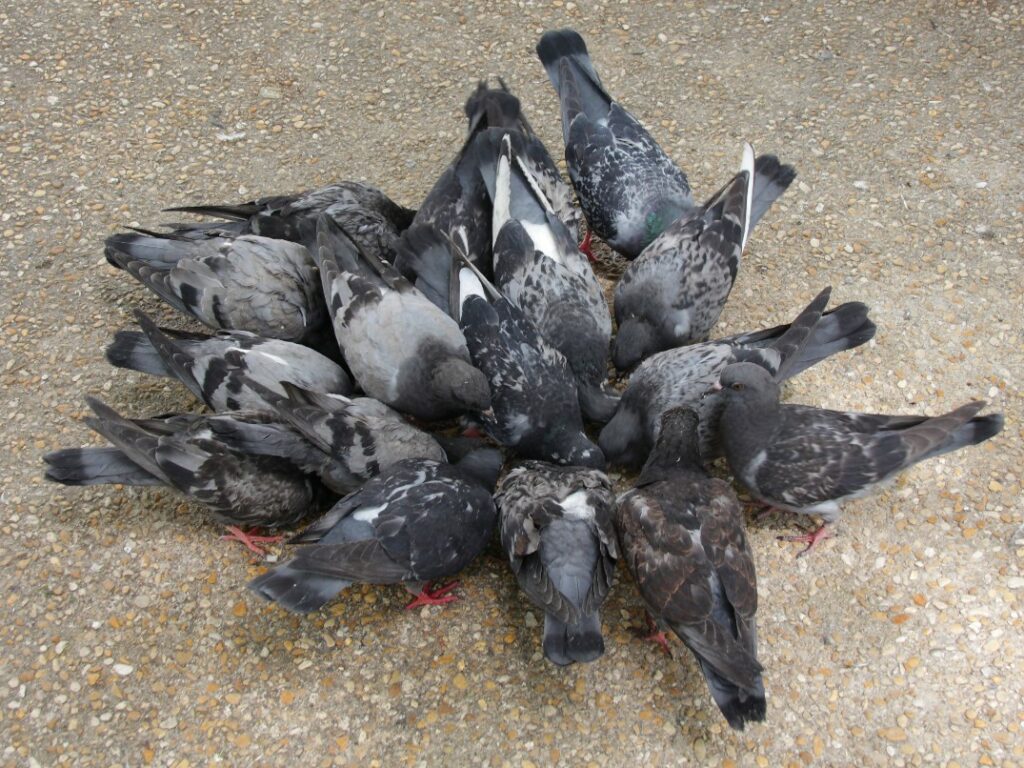
What do pigeons eat? TL;DR
Pigeons primarily eat seeds and grains. They are opportunistic feeders, which means they can adapt their diet to what’s available in their environment. In addition to seeds and grains, they can eat fruits, greens, and occasionally small insects or worms. However, not all foods are beneficial to them. For example, bread, while commonly fed to pigeons, isn’t nutritionally adequate and can cause health problems if it forms a large part of their diet. The specific diet can vary slightly among different species of pigeons based on their habitats and available food sources.
What do pigeons eat? Understanding pigeons
Alright, to truly understand what our feathered friends eat, let’s start with a little bird biology.
General Characteristics of Pigeons
Pigeons, or rock doves as they’re scientifically known, are rather fascinating creatures. They have a knack for adapting to various environments, from busy city streets to peaceful parks. It’s no wonder that they’ve spread across almost every corner of the world!
Now, when it comes to size, pigeons are typically between 9 to 10 inches tall. You’d recognize them by their stout bodies, short necks, and tiny heads. They have a rather smooth plumage, ranging in shades from white and gray to black, often with iridescent feathers around the neck area.
As anyone who’s ever observed these birds can attest, pigeons have an affinity for grains and seeds. In fact, their beaks are perfectly designed for pecking and picking up these tiny morsels. But to understand why they prefer these foods, we need to take a look inside – at their digestive system.
Digestive System of Pigeons
The pigeon’s digestive system is perfectly adapted to handle a diet that’s high in grains and seeds. The process begins in the beak, which picks up and breaks down food.
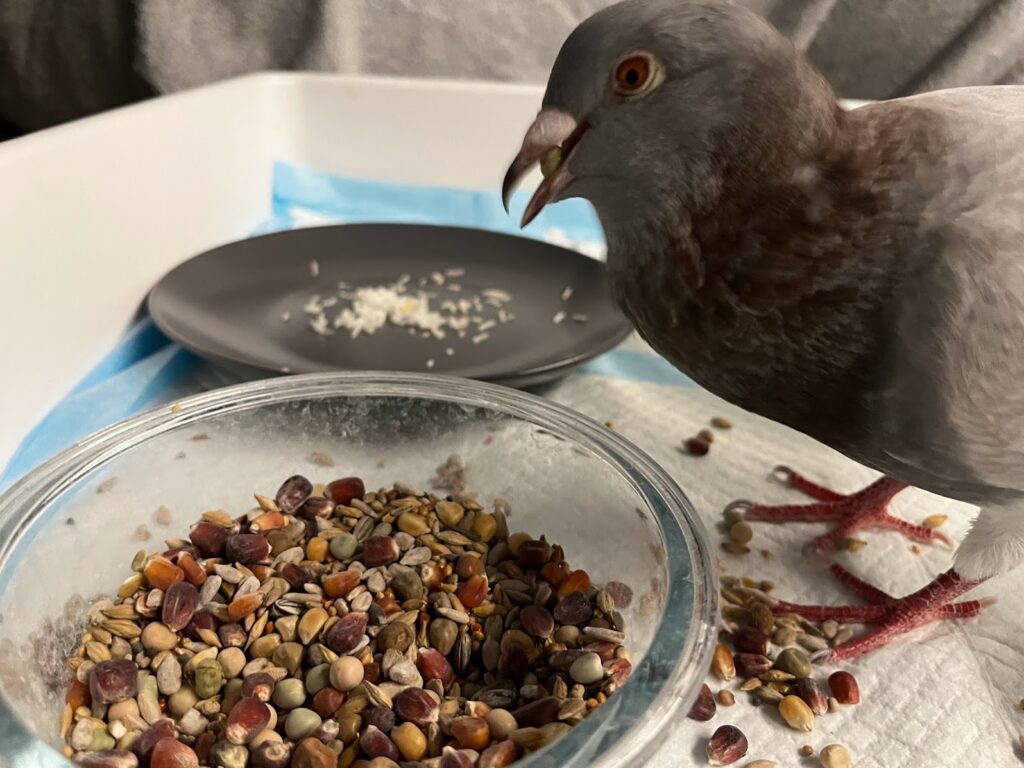
From there, the food goes down the esophagus and into the crop. This is a pouch-like structure where food is stored and, in the case of parent pigeons, turned into crop milk to feed their young ones (a unique pigeon trait!). After the crop, the food makes its way to the stomach, which is divided into two sections:
- The proventriculus, where digestive enzymes begin to break down the food.
- The gizzard, a muscular structure where the food is ground down further – often with the help of grit or small pebbles that pigeons intentionally ingest.
The food then moves through the intestines, where nutrients are absorbed, and finally, the waste is expelled through the cloaca.
What Do Pigeons Eat in the Wild?
Let’s first explore what pigeons eat in the wild.
Overview of Natural Pigeon Diet
In the wild, pigeons have a primarily granivorous diet, which means they mainly eat grains and seeds. However, they are opportunistic eaters, which means that they’ll eat what’s available in their environment. So, in addition to seeds and grains, they’ll eat fruits, greens, and even small insects and worms on occasion.
It’s important to note that while pigeons can eat a variety of foods, not all foods are good for them. For example, bread – often tossed at pigeons in parks – is not nutritionally adequate and can cause health problems if it makes up a large part of their diet.
Dietary Variations Among Different Pigeon Species
While we often lump all pigeons together in our minds, there are actually over 300 different species of pigeons and doves (yes, doves are a type of pigeon!). Each species might have slightly different dietary preferences based on their specific habitats and available food sources.
For instance, the wood pigeon, found often in rural and wooded areas, has a diet heavy in agricultural grains, shoots, and buds. In contrast, the city-dwelling rock pigeon, like my Gerard, will have a diet consisting mostly of discarded human food, birdseed, and the occasional insect.
In short, the diet of a pigeon can be quite varied, and while grains and seeds are their primary food source, they have been known to adapt their diet based on their environment and available food sources. Understanding this helps us provide for these birds in a way that supports their health and longevity.
Impact of Environment on Pigeon Diet
One of the fascinating things about pigeons is their adaptability, particularly with regards to their diet. This adaptability is especially evident when comparing the diets of pigeons living in different environments.
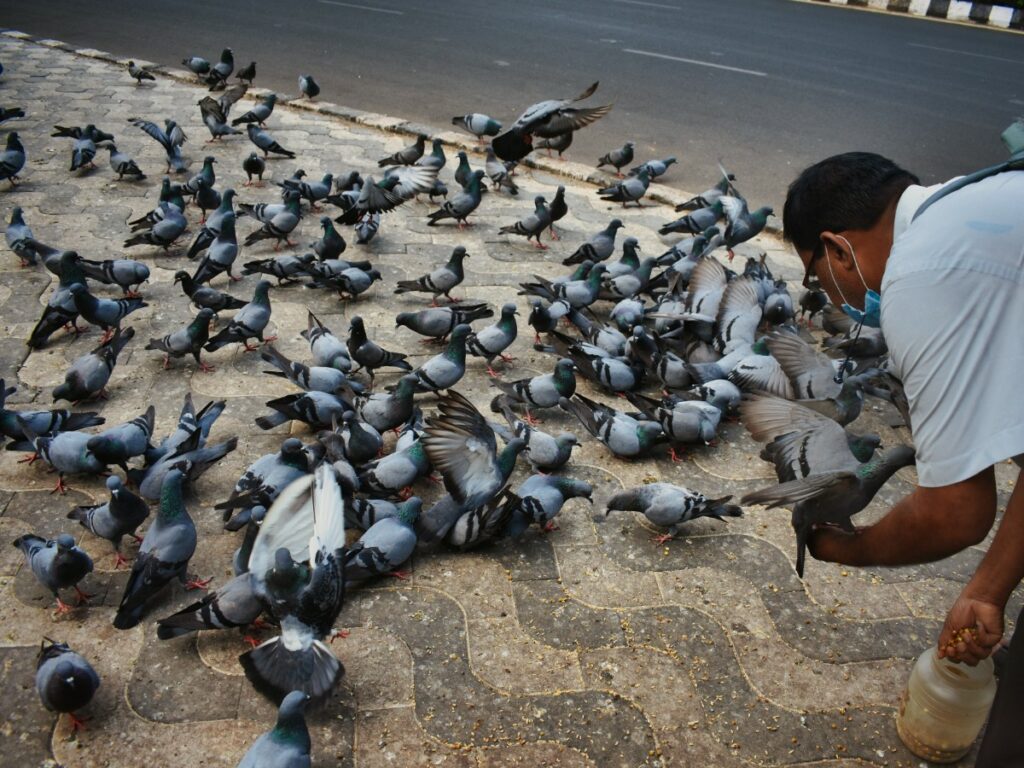
Effect of Urban Environment on Pigeon Diet
Living in an urban environment can dramatically alter a pigeon’s diet. City pigeons are opportunistic eaters, which means they’ll eat almost anything they come across. It’s not unusual to see them pecking at discarded food on the streets, from bread crumbs to pizza crusts and other food scraps. While these food items can provide sustenance, they are often nutritionally deficient and not ideal for the pigeons’ health.
Differences in Diet Between Urban Pigeons and Wild Pigeons
In contrast, wild pigeons (those living in non-urban environments) tend to have a diet closer to what nature intended. This diet typically consists of seeds, grains, fruits, and occasionally small invertebrates. Wild pigeons are also more likely to have access to grit, small hard substances such as tiny stones or shells, which aids their digestion.
What do pigeons eat in captivity?
Providing a proper diet for captive pigeons is crucial for their health and wellbeing. Since they don’t have as much freedom to seek out their own food, it’s up to their caretaker to provide a well-balanced diet.
Common Foods for Pet Pigeons
The basis of a pet pigeon’s diet should be a high-quality pigeon seed mix. This typically includes a mix of grains and seeds like corn, peas, barley, and millet. This can be supplemented with fresh fruits and vegetables, like apples, pears, leafy greens, and cooked sweet potatoes.
Nutritional Requirements of Captive Pigeons
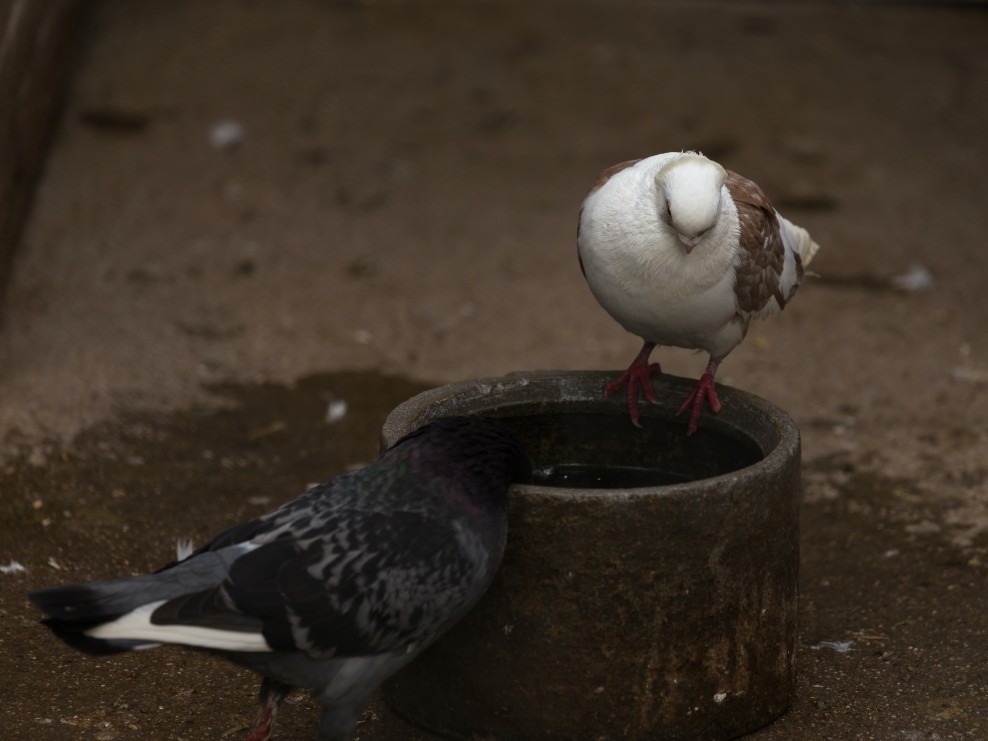
The nutritional needs of pigeons are somewhat complex. They require a balanced mix of protein, fats, carbohydrates, vitamins, and minerals for optimum health. The majority of this nutrition should come from a high-quality commercial pigeon feed, as it is designed to provide the right balance. Fresh water and grit should also be available at all times.
While treats such as bread or popcorn can be given occasionally, they should not form a large part of the diet. Always remember to consult with a veterinarian experienced in bird care to ensure you’re meeting your pet pigeon’s nutritional needs.
Special Dietary Considerations for Pigeons
Different stages of a pigeon’s life require special considerations in terms of diet. These considerations become especially significant during the breeding season and for baby pigeons or squabs.
Pigeon Diet During Breeding Season
During the breeding season, pigeons require additional nutrients for egg production and raising squabs. A protein-rich diet is beneficial during this period, along with added calcium for eggshell formation. This could mean incorporating more legumes into their diet, or providing specially formulated pigeon pellets that contain higher protein content. Calcium supplements, such as crushed oyster shells or cuttlebone, can also be added to their enclosure.
Dietary Needs of Baby Pigeons
Baby pigeons, or squabs, have unique dietary needs. For the first week or so of their lives, squabs are fed crop milk, a nutrient-rich substance produced by both parent pigeons. As they grow, the parents gradually introduce them to partially digested seeds and grains. If you’re raising a squab in captivity, it’s important to replicate this diet as closely as possible. Commercially available crop milk replacements and hand feeding formulas are available for this purpose.
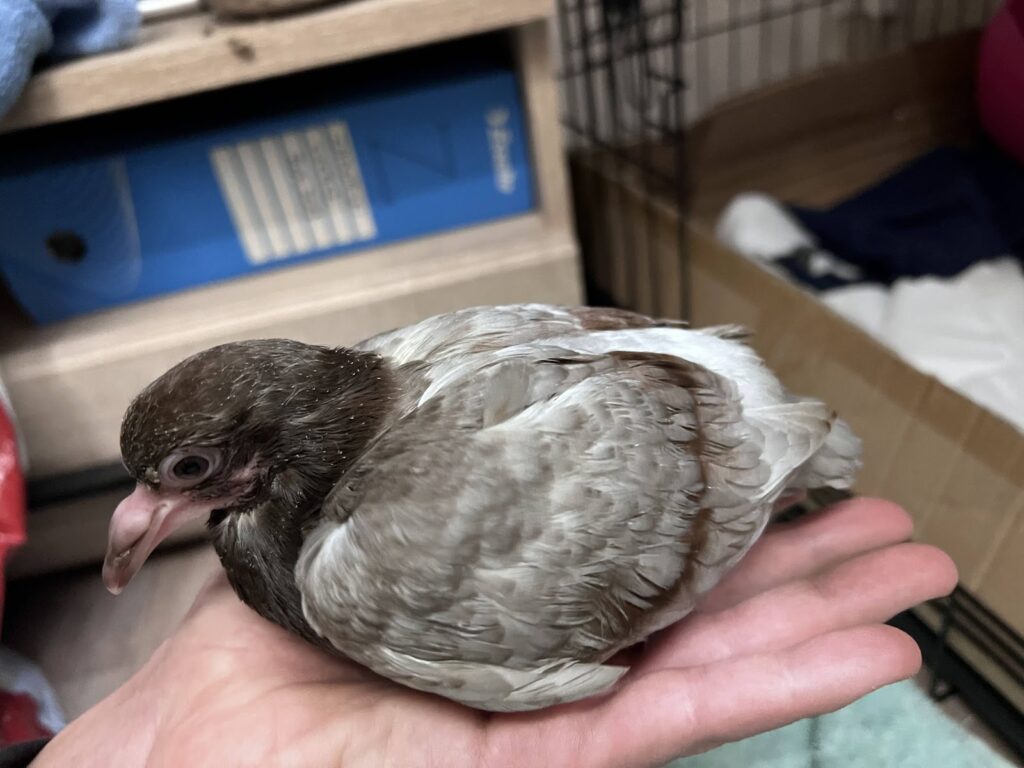
Problems Related to Pigeon Diet
A well-balanced diet is crucial for pigeon health. An improper or imbalanced diet can lead to various health problems.
Impact of Unhealthy Diet on Pigeon Health
Just like in humans, an unhealthy diet can have serious consequences for pigeons. An over-reliance on food scraps or low-quality feed can lead to obesity, malnutrition, and other health issues. Moreover, some foods, like chocolate, avocado, and certain types of raw beans, can be toxic to pigeons.
How to Identify and Address Dietary Problems
Symptoms of dietary problems in pigeons can include lethargy, unexplained weight loss or gain, dull feathers, or changes in their droppings. If you notice any of these signs, it’s important to consult with a veterinarian.
To address dietary problems, first, review what you’re feeding your pigeon. Make sure they’re getting a balanced diet with plenty of variety. Commercial pigeon feed is a good base, but it can be supplemented with suitable fresh fruits and vegetables. Regular access to grit is also essential for digestion. If you’re unsure about any aspect of your pigeon’s diet, it’s always best to consult with an avian veterinarian. They can provide personalized advice based on your pigeon’s specific needs.
What do pigeons eat? Case studies
Research and personal experiences can offer valuable insights into pigeon diets and their implications on health and behavior.
Research on Pigeon Diet and Its Implications
Several research studies have explored the diet of pigeons, yielding fascinating findings. For instance, a study published in the Journal of Avian Biology found that urban pigeons primarily feed on human food waste, which can lead to nutritional imbalances. This finding underscores the importance of promoting a natural diet for pigeons, even in urban environments.
On the other hand, research conducted by the British Trust for Ornithology discovered that, contrary to popular belief, feeding small amounts of bread to birds, including pigeons, does not cause them significant harm. Nevertheless, bread shouldn’t make up the bulk of their diet due to its low nutritional content.
Personal Experiences and Observations (as a pet pigeon owner)
As a pet pigeon owner, my observations have largely been consistent with these findings. I’ve found that my pigeons thrive on a balanced diet of commercially available pigeon feed, supplemented with fresh fruits and vegetables. I’ve also noticed that my pigeons show clear preferences for certain foods, which can vary between individual birds. Observing your pigeons and getting to know their preferences can help ensure that they receive a well-balanced and enjoyable diet.
How to Feed Pigeons: Guidelines and Tips
Whether you’re a pigeon owner or someone interested in feeding wild pigeons, there are certain guidelines and tips that can help ensure the pigeons’ health and wellbeing.
Do’s and Don’ts of Feeding Pigeons
Do’s:
- Do provide a balanced diet: Whether you’re feeding pet or wild pigeons, aim to provide a balanced diet. Commercial pigeon feed, supplemented with suitable fresh fruits and vegetables, can provide a good balance of nutrients.
- Do observe the pigeons: By observing their behavior, you can adjust their diet based on their preferences and needs.
- Do provide clean water: Pigeons need access to fresh, clean water for drinking and bathing.
Don’ts:
- Don’t feed them junk food: Foods like chips, candy, and processed foods are unhealthy for pigeons.
- Don’t overfeed: Overfeeding can lead to obesity and other health problems. It’s better to provide smaller, more frequent meals than one large one.
- Don’t ignore changes in behavior: If a pigeon’s eating habits change, it could be a sign of illness. Consult a vet if you notice anything unusual.
Advice for Those Interested in Feeding Wild Pigeons
If you’re interested in feeding wild pigeons, be sure to do so responsibly. While it’s okay to give pigeons small amounts of bread or other scraps, these should be offered sparingly. Instead, consider providing seeds, grains, or commercial pigeon feed, which are more nutritionally balanced. Always remember to respect local regulations about feeding wildlife, and consider the potential impact on the local ecosystem before you begin.
What do pigeons eat? Final thoughts
What pigeons eat has a profound impact on their health, wellbeing, and even their behavior. Whether in the wild or in captivity, pigeons require a balanced diet to thrive.
As caretakers, pigeon enthusiasts, or simply as individuals who come into contact with these fascinating birds in our urban landscapes, understanding their dietary needs enables us to contribute positively to their wellbeing.
With knowledge, respect, and care, we can coexist with pigeons in a way that supports their health and the health of our shared environment.
What do pigeons eat? FAQs
What is the natural diet of a pigeon?
Pigeons naturally eat a variety of grains and seeds. They also consume berries, fruits, and occasionally insects and earthworms.
Can pigeons eat bread?
Although pigeons can eat bread, it should only be given in small amounts as it’s not nutritionally balanced. Feeding bread regularly can lead to malnutrition and other health issues.
Are pigeons herbivores, carnivores, or omnivores?
Pigeons are primarily granivores, meaning they primarily eat grains and seeds. However, they can occasionally eat small insects, making them omnivores.
What should I feed my pet pigeon?
A pet pigeon’s diet should be varied and balanced. It should primarily consist of specialized pigeon mix that includes a variety of grains and seeds. Fresh fruits and vegetables can also be included.
Can pigeons eat rice?
Yes, pigeons can safely eat rice, both cooked and uncooked.
Can pigeons eat birdseed?
Yes, pigeons can eat birdseed, but it should be part of a varied diet.
Do pigeons need water?
Yes, like all birds, pigeons need fresh, clean water for drinking and bathing.
Is it safe to feed pigeons in public spaces?
While it’s not harmful to feed pigeons occasionally, regular feeding can make them dependent and disrupt their natural foraging behaviors. If you do feed them, opt for healthier options like seeds and grains rather than bread or junk food.
What foods are harmful to pigeons?
Foods high in salt, sugar, and fats are not suitable for pigeons. Certain foods like chocolate, onions, avocado, alcohol, and caffeine are toxic to them.
Can pigeons eat fruits and vegetables?
Yes, pigeons can eat certain fruits and vegetables, but they should make up a smaller portion of their diet compared to grains and seeds.
Do baby pigeons eat the same food as adults?
No, baby pigeons, or squabs, are fed a substance called ‘crop milk‘ by their parents for the first few weeks of their life. As they grow older, their diet gradually transitions to seeds and grains.
What is crop milk?
Crop milk is a highly nutritious substance produced by both parent pigeons in their crop, a part of their digestive tract. It is fed to squabs for the first few weeks of their life.
Can I feed my pet pigeon kitchen scraps?
It depends on the scrap. While some foods like cooked rice or vegetables can be safe, many human foods are not suitable for pigeons. Foods high in salt, sugar, or fat, and any food that is spoiled or mouldy, should not be fed to pigeons.
Do pigeons eat insects?
While pigeons primarily eat grains and seeds, they are opportunistic feeders and can occasionally eat insects, especially when other food sources are scarce.
How often should I feed my pet pigeon?
Pet pigeons should have access to food at least twice a day. However, it’s also important to ensure they’re not overeating. Consulting with a vet or an avian nutritionist is always a good idea when setting up
Check these related articles about pigeons:
- Why Does A Pigeon Coo?
- How Often Do Pigeons Poop?
- How To Clean Pigeon Poop
- How Long Do Pigeons Live?
- Do Pigeons Explode When They Eat Rice?

